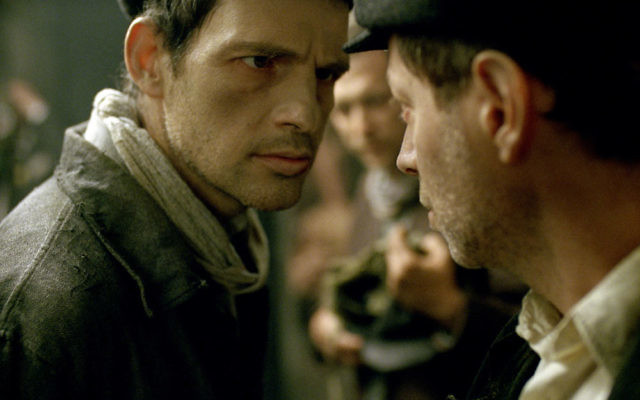Harrowing Oscar-winning drama
The Hungarian film Son of Saul won the Academy Award for best foreign language film this week. AJN film critic Don Perlgut rates it as one of the finest Holocaust dramas ever made. Read his review.
FILM REVIEW of Son of Saul by Don Perlgut — Son of Saul is one of the finest Holocaust dramas ever made, so powerful and engrossing. It is set entirely in one concentration camp – presumably Auschwitz, although that’s never specified – over a two-day period in October 1944, neatly blending historical events with a quixotic quest by its protagonist.
The resulting film avoids dramatising the slaughter, but still manages to portray the brutality, hopelessness, dehumanisation, and controlled chaos that characterised the Nazi genocide against the Jews: we hear the pounding on the doors of the gas chambers, but do not view what’s inside, only glimpsing the aftermath.
Son of Saul focuses on one character, Saul Auslander (Geza Rohrig), a member of the Sonderkommando – those inmates selected by the SS guards to accompany prisoners to the gas chambers and to clean up afterwards, taking bodies to the ovens and disposing of the ashes.
One day, Saul discovers the corpse of a boy who he believes is his son. “But you never had a son,” someone says. “Not by my wife,” he replies.
As the Sonderkommando plan a rebellion (which really did take place on October 7, 1944), Saul decides to carry out an impossible task: find a rabbi to recite Kaddish and hold a proper burial.
This film, which won the Cannes Film Festival’s Grand Prix and also the Golden Globe for best foreign film, owes part of its success to brilliant acting by Rohrig, a New York-based Jewish Hungarian writer, poet and part-time actor who recently graduated from the Jewish Theological Seminary. He portrays Saul as enigmatic, slight and streetwise.
The life of Sonderkommandos was limited. Although they were given extra food and relative freedom of movement around the camp, the Nazis killed them every few months in order to erase the possibility of witnesses.
Incredibly, buried Sonderkom-mando eyewitness accounts from Auschwitz survived the war and were published under the title Voices From Beneath the Ashes (also known as The Scrolls of Auschwitz), and these provided key inspiration to director Laszlo Nemes and his co-writer Clara Royer.
Saul tries valiantly to humanise death, to give a sense of individuality to the many who died. Is his attempt suitable? Possibly not. As one character says to him, “You fail the living for the dead.” But as an act that demands humanity, or possibly as an indication of Saul’s serious psychosis, it is powerful.
Technically, Son of Saul is a marvel, with a virtuoso cinematic style that almost always shows only Saul’s point of view. Backgrounds are out of focus, and we generally only see what Saul sees and experiences.
The director has resorted to almost no wide shots; everything is in close-up or mid-shot, often showing only half a person. There are also very few edits, including the film’s opening shot, which goes on for about three minutes. The result is claustrophobic yet powerful.
The film’s European roots enhance its sense of verisimilitude. Unlike Steven Spielberg’s acclaimed Schindler’s List, Son of Saul uses the real languages of the characters: Hungarian, Yiddish, German, Polish and Hebrew.
Those who understand Hungarian and German, in particular, will get the most out of this film, because knowing the national and religious background of each speaker is important.
Son of Saul contains no back story; the film just begins. Nor is there an epilogue; when the film ends, you know it’s over.
Son of Saul is now screening.


comments